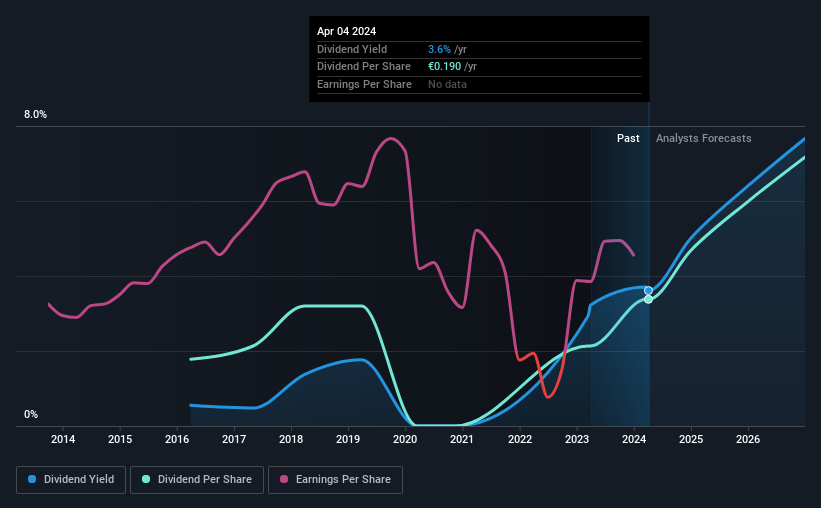Multitude (ETR:FRU) Has Announced That It Will Be Increasing Its Dividend To €0.19
Multitude SE's (ETR:FRU) dividend will be increasing from last year's payment of the same period to €0.19 on 7th of May. This will take the annual payment to 3.6% of the stock price, which is above what most companies in the industry pay.
Check out our latest analysis for Multitude
Multitude's Dividend Is Well Covered By Earnings
If the payments aren't sustainable, a high yield for a few years won't matter that much. However, prior to this announcement, Multitude's dividend was comfortably covered by both cash flow and earnings. As a result, a large proportion of what it earned was being reinvested back into the business.
The next year is set to see EPS grow by 133.2%. Assuming the dividend continues along recent trends, we think the payout ratio could be 17% by next year, which is in a pretty sustainable range.
Multitude's Dividend Has Lacked Consistency
Multitude has been paying dividends for a while, but the track record isn't stellar. This makes us cautious about the consistency of the dividend over a full economic cycle. Since 2016, the dividend has gone from €0.10 total annually to €0.19. This works out to be a compound annual growth rate (CAGR) of approximately 8.4% a year over that time. It's good to see the dividend growing at a decent rate, but the dividend has been cut at least once in the past. Multitude might have put its house in order since then, but we remain cautious.
Dividend Growth Potential Is Shaky
With a relatively unstable dividend, it's even more important to see if earnings per share is growing. Over the past five years, it looks as though Multitude's EPS has declined at around 11% a year. A sharp decline in earnings per share is not great from from a dividend perspective. Even conservative payout ratios can come under pressure if earnings fall far enough. It's not all bad news though, as the earnings are predicted to rise over the next 12 months - we would just be a bit cautious until this becomes a long term trend.
In Summary
Overall, we always like to see the dividend being raised, but we don't think Multitude will make a great income stock. The company is generating plenty of cash, which could maintain the dividend for a while, but the track record hasn't been great. We would probably look elsewhere for an income investment.
Companies possessing a stable dividend policy will likely enjoy greater investor interest than those suffering from a more inconsistent approach. Meanwhile, despite the importance of dividend payments, they are not the only factors our readers should know when assessing a company. For example, we've picked out 1 warning sign for Multitude that investors should know about before committing capital to this stock. Looking for more high-yielding dividend ideas? Try our collection of strong dividend payers.
Have feedback on this article? Concerned about the content? Get in touch with us directly. Alternatively, email editorial-team (at) simplywallst.com.
This article by Simply Wall St is general in nature. We provide commentary based on historical data and analyst forecasts only using an unbiased methodology and our articles are not intended to be financial advice. It does not constitute a recommendation to buy or sell any stock, and does not take account of your objectives, or your financial situation. We aim to bring you long-term focused analysis driven by fundamental data. Note that our analysis may not factor in the latest price-sensitive company announcements or qualitative material. Simply Wall St has no position in any stocks mentioned.

 Yahoo Finance
Yahoo Finance 
